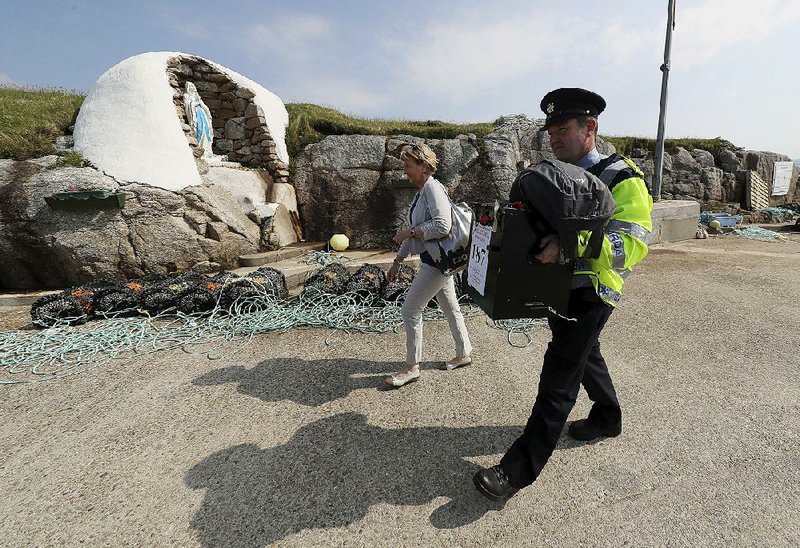DUBLIN -- An abortion debate that has inflamed passions in Ireland for decades will come down to a single yes-or-no question today, as residents vote on whether to repeal the country's strict anti-abortion law.
Anti-abortion activists view the referendum as a last-ditch stand against what they view as a European norm of abortion-on-demand, while for pro-abortion rights advocates, it is a fundamental moment for declaring an Irish woman's right to choose.
If the "yes" side prevails and the constitutional ban on abortions is repealed, the government plans to introduce legislation that would allow abortion within the first 12 weeks of pregnancy, and later in specific cases when the woman is at grave risk or the fetus is likely to die in the womb or shortly after birth. Parliament would then debate this plan.
Opinion surveys suggest a continuing change of attitudes in Ireland, a traditionally Roman Catholic country that surprised many by voting in favor of same-sex marriage in 2015. Both sides generally agree that the frenzied campaign ahead of today's vote has not produced the dramatic shift in public opinion that anti-abortion campaigners were hoping for.
Still, David Quinn of the socially conservative Iona Institute says the "no" forces still have "a fighting chance," and recalled other recent political upsets.
"Remember: Brexit wasn't supposed to pass, and Donald Trump wasn't supposed to get elected," he said, referring to the United Kingdom's vote to exit the European Union.
Activists from both sides have put up thousands of emotional signs pleading their case and there were small demonstrations in Dublin on Wednesday as the vote neared.
Today's poll will be the fourth time in as many decades that Irish voters have been asked to decide on the issue of abortion.
But this time the debate has been roiled by two factors that voters have not faced before: The extraordinary power of social media and the increased availability through telemedicine websites of new drugs that allow women to make profound decisions over whether to end a pregnancy in the privacy of their homes.
Facebook and Google have both taken steps to restrict or remove ads relating to the referendum in a move designed to address global concerns about social media's role in influencing political campaigns, from the U.S. presidential race to the U.K.'s exit vote.
At the heart of this vote is whether or not to reverse a far-reaching 1983 referendum that inserted an amendment into Ireland's constitution that committed authorities to equally defend the right to life of a mother and that of a fetus from the moment of conception.
The issue has been revisited repeatedly after heartrending "hard cases" that, abortion-rights activists say, exposed vulnerable women to miserable choices -- and even, at times, death.
Abortion is legal in Ireland only in rare cases when the woman's life is in danger, and several thousand Irish women travel each year to terminate pregnancies in neighboring Britain. That number has fallen dramatically in recent years as women turned to online websites to illegally import drugs that end pregnancies.
One woman who flew to the Netherlands for an abortion she could not get at home said she is voting "yes" to support others in a similar predicament.
Tara Flynn was 37 when she found out she was pregnant. She had used the day-after contraceptive pill but it failed.
"I felt trapped in my body and trapped in my country," said Flynn, now 48. "And because of the eighth amendment I didn't even know where I could turn to for help."
After researching online, Flynn traveled to Amsterdam for the abortion. She said she felt isolated, ashamed and excluded when she returned.
"A vote for 'yes' tomorrow isn't a vote for abortion, it is a vote for solidarity, it is a vote for compassion," she said. "It is a vote to say, I don't send you away anymore."
The Irish Times said in its editorial Thursday that the constitutional abortion ban must be repealed because it has left doctors confused as to what is legal, and led women to travel abroad "in secrecy and shame" for abortions.
It cited as the type of "grotesque spectacle" the ban has caused the case of a 14-year-old who became pregnant and suicidal after being raped. She had to go to the Supreme Court after the government blocked her from traveling to get an abortion.
In an effort to neutralize the "hard cases" argument pushed by abortion-rights activists, some prominent anti-abortion campaigners have lately shifted their stance, even suggesting that new laws could be enacted to permit abortions in certain limited cases.
But that compromise was dismissed by Irish Prime Minister Leo Varadkar, a medical doctor who favors repealing the constitutional ban. He said it is the country's "hard laws that create hard cases."
Information for this article was contributed by Renata Brito and Jill Lawless of The Associated Press.
A Section on 05/25/2018

